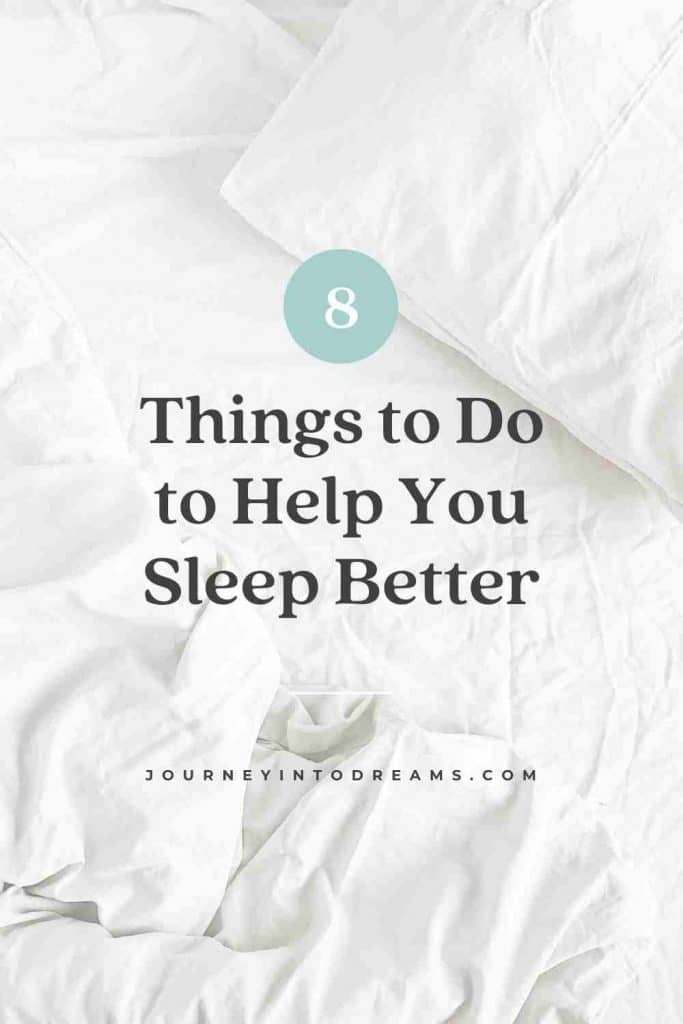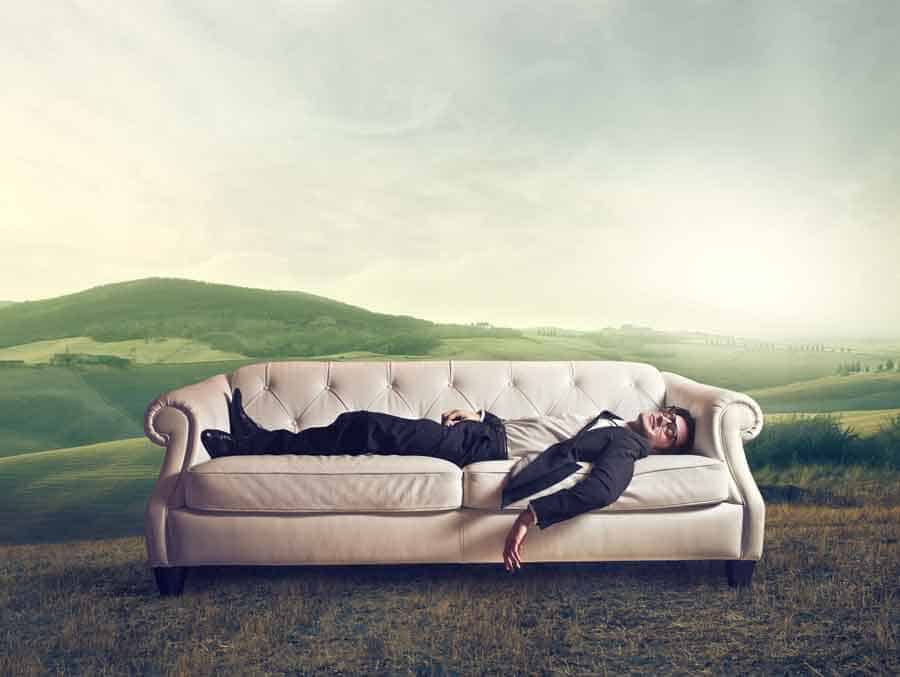How to Fall Asleep: 8 Tips to Sleep Better at Night
You know what it’s like: It’s 2 am and you’re still not asleep yet. You’ve tried EVERYTHING…and you’re feeling tired…but you still can’t make yourself fall asleep.
If you have trouble falling asleep, this list of 8 things you can do to fall asleep faster will help you get the good night’s rest you deserve.

1. First Things First: Establishing a Bedtime Routine
Your bedtime routine is the most important part of making sure you can fall asleep around the time you want to. If you don’t have a bedtime routine yet, now is time to make one.
Here are some things to do before bedtime:
Dim the Lights: About an hour and a half before I’m ready to sleep, I “put the house to bed”. I turn off all the bright overhead lights and leave only a few dim lights on. I turn off all the TVs. By dimming the lights and making it darker in your home before bedtime, it signals to your body that it’s time to sleep. It’s also time to get off the computer, as the screen emits too much light and that can mess with your circadian rhythms (your “biological clock”).
Do quiet, boring activities: Nothing zonks me out more than trying to do a crossword puzzle right before bed. It helps my mind think about anything besides what else I might be thinking about. You can read, do puzzles, knit, journal…whatever activities you enjoy and help gets your mind off worrisome things and are quiet and don’t require much light.
Drink Water: One of the reasons we have trouble falling asleep is because we get dehydrated. Try drinking a glass of water an hour before bed, and of course be sure to drink at least 5-6 glasses of water during the day.
Turn Down the Thermostat: University of Pittsburgh researchers found that people sleep better in cool temperatures than they do when it’s warm. Try turning your thermostat somewhere between 60-65 degrees to see if that helps you fall asleep better. If you get cold, you can always use extra blankets.
Listen to Soothing Music: Often times I read and write before bed, and while I read and write I also listen to my sleepy-time playlist. I choose very soothing songs that are peaceful and relaxing. Radiohead, Barcelona, Coldplay, Moby, Hem, and a few others frequently make it to the top of my list. Your musical taste may vary, but that is the type of music I find most soothing for sleeping.
Eat Oatmeal: While most people think this is for breakfast, it actually makes for a great night time snack as well. Oatmeal calms your nervous system and contains melatonin that can help you fall asleep faster. If you are worried about this causing you to gain weight – rest assured, oatmeal is one of the healthiest foods in the world and no study ever has shown oatmeal to cause people to get fat – it usually is the opposite.

2. Make Your Room Perfect for Sleeping
Making your room perfect for sleeping is important too. Our post on Creating a Sacred Space for Dreaming can help you make your bedroom a cozy and inviting space for sleep.
Here are some tips for making your room a nice cozy retreat perfect for getting some sleep:
Make Your Bed as Comfortable as Possible: It astonishes me how many people try to sleep with hard pillows and itchy blankets. No wonder you’re still awake! We use t-shirt sheets, a nice worn out quilt, and try to get new pillows every few months. Your mattress also makes a huge difference. My husband and I one day, fed up with our lumpy mattress, built our own custom bed by using ply-wood and memory foam. Making your bed comfortable will make it easier for you to sleep – and stay asleep.
Add Background Noise: I’m not a fan of noise machines, but I absolutely love having a fan on while we sleep. Not only does it help with keeping the room temperature nice and cool, but it gives you some white noise that helps drown out sounds like crickets chirping or the refrigerator humming that might keep you awake.
Use Your Bed for Sleep Only: This one is hard for me to keep (I love relaxing in bed with my laptop/cell phone), but it is really good advice. By only using your bed for sleep, it help signals to your body that this is the place you rest and helps you shut your mind off from everything else. So if possible, only sleep in your bed – and nothing else.
3. Don’t go to Bed Unless You’re Sleepy:
If you’re not tired when you go to sleep, don’t try to force yourself to fall asleep. That won’t happen – instead you’re going to set yourself up for a vicious cycle of insomnia, frustration and anxiety. So, continue doing a really boring activity such as reading, writing, crossword puzzle, etc. until you finally feel tired.
4. Get Back Up If You Haven’t Fallen Asleep in 15 Minutes:
If you find yourself still struggling to sleep after 10-15 minutes, get back out of bed. Don’t lay there and watch the clock. Go back to doing you quiet activities until you feel sleepy again. It’s okay to stay up past your bedtime once in awhile.
5. Wake Up at the Same Time Every Morning:
Waking up at the same time in the morning helps reset your biological clock, making it easier for you to fall asleep at night. Avoid taking naps during the day, as this can disrupt your sleep cycle.
Set an alarm clock to go off each and every morning at the same time. It may take several weeks or months, but before long you will find yourself naturally waking up at the same time everyday – sometimes even a minute or two before your alarm.
6. Schedule Your Worrying Time Long Before Bedtime:
Ideally, we wouldn’t worry about anything at all. But in honesty, we tend to worry the most about the dumbest things right before bed. Maybe you’re worried about plans you have for tomorrow or you’re worried about something you have to do you don’t want to do. Maybe little fears start popping into your mind before bedtime.
So, the better alternative is to schedule that worry time earlier, a long time before bed. This gives you time to prepare and think about solutions and make it so you don’t worry right before you try to fall asleep.
7. Exercise During the Day:
Getting exercise during the day can help you sleep better as well. Go swimming, take a walk, do dance aerobics – whatever physical activity you enjoy. By using up your energy, it helps you better get into a sleep cycle.
8. Talk to Your Doctor
Sleep is necessary for us to stay healthy, and more people struggle with being able to fall asleep than you might think.
Talking to your doctor about your troubles sleeping can help you recognize if there are any underlying causes for your inability to sleep. Your doctor may have you do a sleep study to rule out any biological issues or may even prescribe you something that will help you get the rest you deserve.
Are you getting a good night’s rest each night? Do you have any tips for helping someone fall asleep? Share your thoughts in the comments section below!





